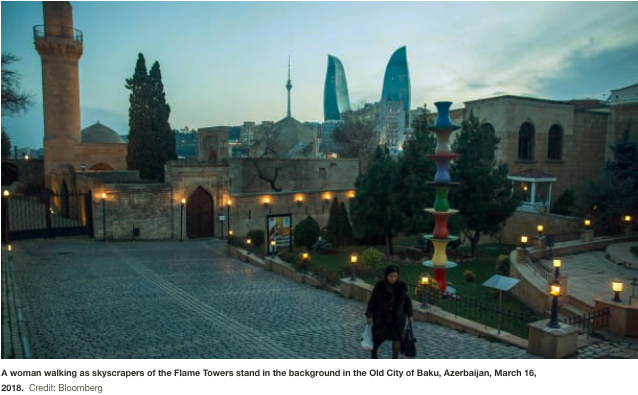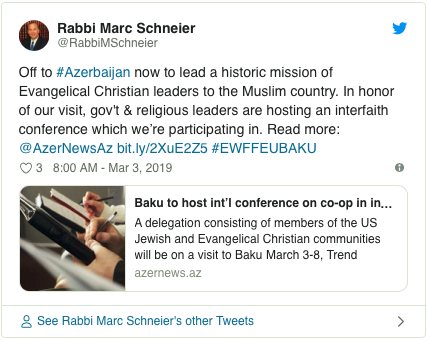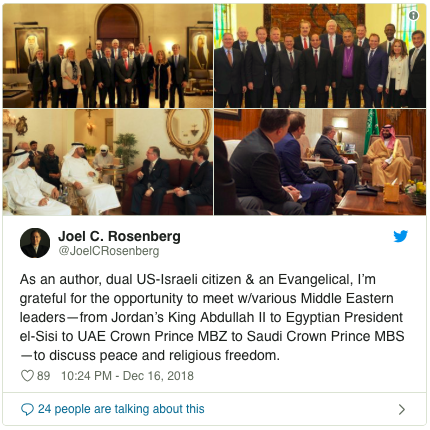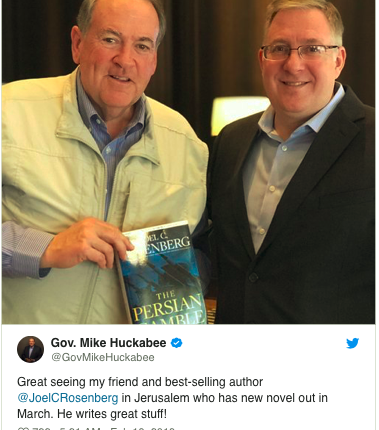
Haaretz
By Amir Tibon
March 4, 2019
The visit by a group of American pastors to Azerbaijan this week is the latest instance of outreach from the Muslim world, following prior visits to Egypt, the UAE, Jordan and Saudi Arabia — and it is not all about gaining access to the Trump administration

WASHINGTON — A delegation of evangelical Christian leaders, mostly from the United States, touched down in Azerbaijan early Monday morning. The decision by the Muslim-majority country, which has close ties to Israel, to host the group is part of a broader trend in which many Muslim and Arab countries are making efforts to improve their standing with U.S. evangelicals.
There are an estimated 60 million evangelicals in the United States, and under President Donald Trump they have enjoyed historical levels of political influence in Washington — especially with regard to foreign policy. This has led countries that are seeking to gain more influence in D.C. to reach out to prominent evangelicals in a bid to win their support.
Evangelicals are known to generally be very supportive of Israel, which has led some Arab and Muslim countries to emphasize their ties with the Jewish state as a “selling point” to them.
This week’s Baku delegation is led by New York-based Orthodox rabbi, Marc Schneier. Prior to departing, Schneier told Haaretz last week that Azerbaijan will highlight to the visiting evangelicals that “it is the most supportive of Israel among the world’s Muslim-majority countries.”

The Azerbaijan delegation includes 14 evangelical pastors. One of them is Robert Stearns, a pastor who told Haaretz last year about his ongoing battle to connect young U.S. evangelicals to Israel. Both Stearns and Schneier spoke at an event on Capitol Hill last year marking the friendship between Azerbaijan and Israel.
“Azerbaijan is very unique in its commitment to interreligious dialogue and activities,” observes Schneier. He adds that, to the best of his knowledge, the evangelical delegation visiting Baku this week is the first of its kind to the country.
Alongside meeting leading political figures in Azerbaijan’s government and attending a conference called “From Interfaith and Intercivilizational Dialogue to Cooperation,” the pastors are also scheduled to meet with the Israeli ambassador to Baku, George Deek — himself Israel’s first Arab-Christian diplomat.
Azerbaijan is not alone in investing in its ties with the evangelical community. Prominent U.S. evangelicals have met with leaders from Egypt, Jordan, Saudi Arabia and the United Arab Emirates over the past 18 months, while Qatar and Bahrain have separately made their own outreach efforts.
While there have been ties between the evangelical community and Muslim governments for years, the cooperation since Trump entered the White House in January 2017 is unprecedented.
Stranger than fiction
One person who has played a key role in advancing these new relationships is Joel C. Rosenberg, a best-selling author who was born in the United States but currently lives with his family in Israel.
Rosenberg, himself an evangelical Christian, has written a number of political thrillers on the Middle East, including one in which ISIS conquers Jordan and another focusing on Iran’s war efforts in the region. None of his books, however, has featured a scene in which an Israeli citizen sits next to the Saudi crown prince. Something like that could only happen in real life.

Rosenberg says he told Sissi, “You may want to try and do that,” explaining that in addition to the 60 million evangelicals in the United States, there were 10 times as many worldwide. “Without blinking, he immediately told me, ‘Would you be interested in organizing such a meeting?’” Rosenberg recalls.
Some seven months later, in November 2017, a dozen influential evangelicals — including several members of Trump’s evangelical advisory board — arrived at Sissi’s presidential palace in Cairo. It was the first time an Egyptian president had ever hosted such a delegation. (That delegation and the one to Azerbaijan this week are not connected.)
Larry Ross, a public relations expert from Texas who was among the participants, recalls that the meeting with Sissi “was scheduled to be about 30 minutes long, but we ended up sitting with him for three hours.”
During the conversation, Sissi told the group he wanted to “build on the legacy” of Anwar Sadat, the Egyptian president who signed the historic peace agreement between Israel and Egypt in the late 1970s. He also emphasized the importance of finding a way to advance peace between Israel and the Palestinians, saying that such an agreement would open up the possibility of “regional peace” between Israel and the entire Arab world.
Impressive achievement
Two days after the meeting with Sissi, the delegation flew to Jordan, where it was hosted by King Abdullah II. Unlike the Egyptian president, Abdullah had met with evangelical leaders before. Still, for this specific evangelical delegation it was an impressive achievement: Meeting two of the most important leaders in the Arab world within one short trip.
The visit was covered by news outlets across the Middle East — and it turned out to be just the beginning. Sissi held a second meeting with Rosenberg’s evangelical group last September, this time on the sidelines of the UN General Assembly in New York. Not coincidentally, the meeting took place just before a rare meeting between Sissi and Prime Minister Benjamin Netanyahu — a fact the Egyptian president didn’t fail to mention in his discussion with the evangelicals.
Then last December came the most unexpected development in this evolving Arab-evangelical relationship: Rosenberg and other members of his delegation were invited to visit the UAE and Saudi Arabia, to meet their respective crown princes (Mohammed bin Zayed and Mohammed bin Salman) for the first time.
Rev. Johnnie Moore, an evangelical pastor from California, participated in the meetings — which took place just weeks after he returned from a separate visit to Saudi Arabia as part of an interfaith initiative.
“It was a real surprise,” he recalls, noting that Saudi Arabia has had a decades-long reputation for being the harshest Arab-Muslim country on religious issues. Moore says he views the fact that a visit by an evangelical group could take place there as “a huge sign of change.”

The fact that an Israeli citizen, Rosenberg, led the delegation and was joined by his son, who is also an Israeli citizen, was in itself significant. Saudi Arabia doesn’t officially allow most Israelis to enter the country: Having two Israeli citizens sit inside the crown prince’s palace in Riyadh was proof that, in order to win the support of evangelicals, Saudi Arabia’s leadership was open to updating some of its stances toward Israel.
Bahrain and Qatar have also attempted to reach out to prominent evangelicals recently. The Qataris went as far as to spend tens of thousands of dollars on bringing Mike Huckabee — an evangelical pastor and the father of White House Press Secretary Sarah Huckabee Sanders — on a well-publicized visit to the Gulf state.
Not just Washington
While the Arab governments reaching out to evangelicals are predominantly Sunni Muslim, Azerbaijan is a Shi’ite-majority state. “This is part of a long process of creating real partnerships between people of different faiths,” says Schneier of this week’s delegation. “There is an opening now more than ever for doing that.”
One clear reason for Muslim governments to try to attract evangelical support is the influence of the evangelical community upon the Trump administration. Vice President Mike Pence and Secretary of State Mike Pompeo are both evangelicals, and both have played a key role in outlining the administration’s Middle East policy (including being the two most senior U.S. officials at last month’s Mideast summit in Warsaw).
Moore says that while Trump’s rise to power has “clearly accelerated” the ties between these Arab leaders and U.S. evangelicals, there is more to the story than just an attempt to get closer to the current administration.
“In the past,” he says, “these countries relied solely on the support of American administrations when it came to their relationships with the United States. Now, they are beginning to realize that in order to have a truly strong and stable relationship, you also need to have support among the American people — not just in Washington, but all over the country.”
This realization can have an impact on policy priorities. A nation that views its relationship with Washington solely through the prism of maintaining good relations with the U.S. government will focus on security, intelligence and economic ties alone. But a country seeking to win support among a large political and religious constituency in the United States will often try to promote issues that are important to that constituency.

In their attempts to appeal to evangelicals, Arab leaders have focused on promising to protect the well-being of Christians in the Middle East, and on the prospect of improving their countries’ ties with Israel.
One Arab official who spoke with Haaretz about the evangelical outreach efforts, and who asked not to be named due to the sensitivity of the issue, explained that “no country is going to change its policy toward Israel in order to make evangelicals happy. But if a country is already taking some steps toward a different kind of relationship with Israel — and presenting those steps in a more public way can also help you win support in the United States — then perhaps it should be considered.”
Correcting misconceptions
The increased contacts between the evangelical community and the Arab world could certainly contribute to changes in how Arab countries conduct their ties with Israel. Some believe it could also change, or at least challenge, some long-held views about the Middle East within the evangelical community.
In recent decades, evangelicals have donated tens of millions of dollars to Israeli settlements in the occupied West Bank, and many of them have opposed the establishment of a Palestinian state next to Israel. Could the ongoing interaction with Arab leaders who support a two-state solution lead to a more nuanced view of this issue for some evangelicals?
Rosenberg says he believes there is a common misconception about evangelical views regarding Israel and the Palestinians. In the delegation’s meeting with Saudi Crown Prince Mohammed, he says, he touched on that misconception by telling MBS: “Some people think evangelicals who love Israel care little or not at all about the plight of the Palestinians. This is probably true of some evangelicals, but it’s not true of us, or of most evangelical Christians. We grieve for the suffering they have endured. We want a better life for them.”
He also admits that the meetings with Arab leaders were illuminating on this specific issue for some evangelical members of the delegation. He mentions that Sissi, for example, told the delegation why it was important for Egypt to promote a reconciliation agreement between the Palestinian Authority and Hamas.
“I think if it was another leader speaking about this diplomatic effort with Hamas, some people in our group would have been very uncomfortable,” says Rosenberg. “But with Sissi, people felt like we should give him some space to work on it. He’s proven his commitment to peace and to fighting terrorism. Even if we disagree, we shouldn’t be cynical about it — we should at least listen to him.”
Copyright © 2025 Foundation For Ethnic Understanding. All rights reserved. | Privacy Policy